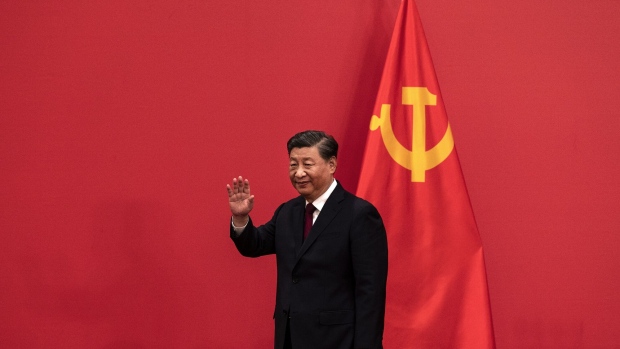Mar 19, 2024
China’s Xi Touts Industry Policy in Visit to Battery Materials Firm
, Bloomberg News

(Bloomberg) -- President Xi Jinping visited a battery materials company in the southern Chinese city of Changsha as he seeks to promote advanced technology sectors as new pillars of the world’s second-largest economy.
Xi toured BASF Shanshan Battery Materials Co. in the provincial capital of Hunan on Monday to inspect how the city is stepping up the development of high-tech growth drivers he coined “new productive forces,” according to a report from the official Xinhua News Agency.
The Chinese leader’s reference to the catchphrase further underscores China’s efforts to move up the value chain after the government highlighted developing those sectors as a priority earlier this month. It comes as the country fights the US over access to semiconductors and trade tensions rise over Chinese manufacturing overcapacity.
The company, which produces materials for batteries used in electric vehicles, is a joint venture formed in 2021 between BASF SE and Ningbo Shanshan Co., with the German chemical giant being the majority owner. Shares of Ningbo Shanshan rose nearly 5% in Shanghai on Tuesday.
BASF has increased its presence in China despite a push by German Chancellor Olaf Scholz’s government to reduce the country’s dependence on the Asian nation. In a separate deal, the chemicals maker is investing around $10 billion in a plant in Zhanjiang on China’s southern coast.
Xi also visited Hunan First Normal University and urged for an expansion of high-quality opening up, a nod to the country’s stated goal of easing market access to attract foreign investment.
China has identified electric vehicles, batteries and solar products as its “new three” growth drivers. But its dominance of the EV supply chain has fueled geopolitical tension with the US and Europe, where policymakers are seeking to wean companies off their reliance on China.
Huang Yiping, a former advisor to China’s central bank, last week said China’s industrial policy is at the heart of US concerns about Chinese overcapacity and the European Union’s anti-subsidy investigation into Chinese electric vehicle imports.
Beijing’s hope that EVs can plug a hole left by a slumping property sector also faces headwinds as sales growth slows amid weak consumer confidence and shifting attitudes toward new-energy vehicles.
Shipments of new-energy vehicles to dealers are projected to increase 25% to 11 million units this year, China’s Passenger Car Association has said. While still expanding, that’s a slowdown from 36% in 2023 and 96% in 2022.
--With assistance from Katrina Nicholas.
(Updates with more context)
©2024 Bloomberg L.P.





